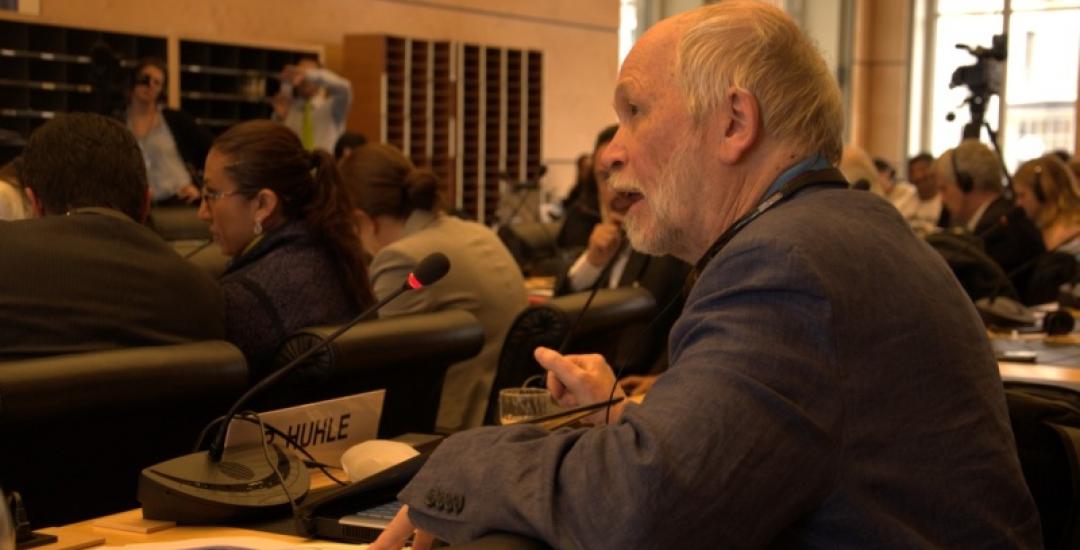
On 18 September, the United Nations Committee on Enforced Disappearances (CED) published its Concluding Observations following initial review of Iraq on 7-8 September 2015, for which Alkarama had submitted a shadow report, presenting its main concerns over the situation of enforced disappearances in the country, and in particular the lack of definition and non-criminalisation of enforced disappearance, as well as the widespread use of secret detention and abductions by government-backed militias. Alkarama's concerns were shared by the Committee, which addressed most of the issues raised by the organisation.
According to the UN Convention on Enforced Disappearances (ICCPED), State parties must submit a report to the Committee two years after the entry into force of the Convention, explaining the measures taken to implement it. After Iraq submitted its initial report – with over a year delay – the country's compliance with the Convention was assessed by the Committee during its 9th session, at the outcome of which its Concluding Observations were published.
Lack of a definition and non-criminalisation of the crime of enforced disappearance
The CED expressed concern over the fact that "an autonomous offence of enforced disappearance has not yet been incorporated into the State party's legislation." In this regard, Alkarama had recommended in its shadow report that Iraq "define and criminalise enforced disappearance as an autonomous offence in full compliance with the Convention and ensure that penalties are fixed in the law and commensurate with the gravity of the crime." Similarly, the Committee called on the State to incorporate the crime of enforced disappearance into its domestic law, which should specifically provide for all modes of liability prescribed in Article 6 ICCPED.
The widespread use of secret detention
In its submission to the UN experts, Alkarama mentioned the secret detention centre located in the Al Muthanna airport, where torture is systematically practiced against detainees, such as Mohammed Abbas Khadim Al Sudani and Riad Al Obeidi. In this regard, the CED mentioned that "while taking note of the assertion by the State party that there are no secret detention facilities, the Committee is concerned at allegations that secret detention has actually been used, even in recent years" and called on the Iraqi authorities to ensure that "any existing secret detention facility or place where people are held in secret detention be immediately closed or converted into regular detention centres in accordance with the Convention and relevant international standards."
Abductions by government-backed militias
Alkarama also raised concern over the fact that "in Iraq, enforced disappearances are committed not only by the Iraqi security services, but also by government-backed militias which have long been operating in the country like regular armed forces with the acquiescence and support of the authorities." The Committee, therefore, expressed concern over allegations of enforced disappearances committed by "militias acting with the authorization, support or acquiescence of State officials" and called on the Iraqi authorities to guarantee that "deprivations of liberty are carried out only by officials authorised by law to arrest and detain persons and in strict compliance with the law."
Conclusions
Although the Committee commended Iraq for having ratified almost all of the UN core human rights instruments and has extended an open invitation to all the special procedures of the Human Rights Council (HRC) to visit the country, it is concerned that "the legislation in force, its implementation and the performance of some of the competent authorities are not in full compliance with the obligations under the Convention. In particular, the Committee is concerned at allegations of a situation of widespread disappearances in significant parts of the State party's territory."
What is next?
After reviewing the situation of enforced disappearances in Iraq, the Committee gave a year to the authorities to implement the following recommendations as a matter of priority:
• Incorporate enforced disappearance into domestic law as an autonomous offence, in line with the definition contained in Article 2 ICCPED;
• Adopt all the necessary measures to ensure that no person is held in secret detention, including by guaranteeing that all persons deprived of liberty are afforded, since the outset of their deprivation of liberty, all the fundamental legal safeguards provided under Article 17 ICCPED; and
• Ensure that all persons who were forcibly disappeared and whose fate is not yet known are searched for and located without delay.
For more information or an interview, please contact the media team at media@alkarama.org (Dir: +41 22 734 1008).
